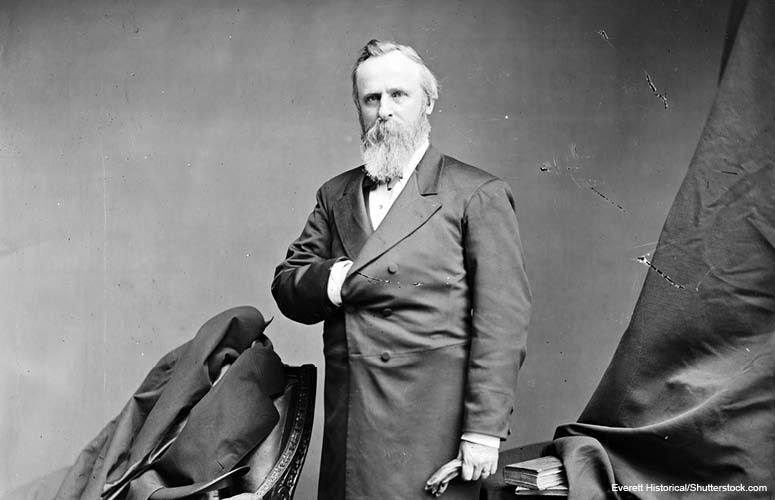Re-elect public sector unions based on merit
Oct 21, 2016
Ohio law supports an outdated “spoils system” that discourages public sector union elections and makes it difficult for many workers to decide who best represents their interests. Laws that support that system need to change.
Rutherford B. Hayes, one of seven U.S. Presidents to hail from Ohio, made civil service reform one of his lasting legacies. He devoted much of his presidency and energy to lay the groundwork for civil reform and significant federal legislation such as the Pendleton Act that would help end to the corrupt practice of awarding government positions to unqualified friends and family.
Ohio’s labor laws today that help entrench unwanted union representation and make it more difficult to remove public sector union officials that have failed—sometimes for years—to serve the interests of their members, would dishearten President Hayes.
The Meritless “Spoils System”
For much of the 19th century, elected officials would often award prominent government positions to friends, family, and political allies as if to thank them for their generous support. This “spoils system” was perfectly legal until 1883, when the Pendleton Act required applicants for government positions to complete an exam and be chosen because of their merit, not as a political favor.
The Pendleton Act, though enacted soon after President Hayes left office, was very much a product of Mr. Hayes’ civil service reform efforts and was instrumental in replacing unqualified government workers with more qualified employees.
Unfortunately, current Ohio law makes it easier for unqualified unions to retain their powerful positions regardless of their performance. In many cases, unions and their officials have practically inherited their positions and now hold them without merit.
The Buckeye Institute’s recent report, One Person, One Vote, One Time? Reelection Votes Hold Unions Accountable to Their Members, explains how winning just one union election could allow a union to hold its position as the exclusive labor representative for workers indefinitely. That means that—after just one vote—a union could represent not only those who voted for it, but all new employees who never had a say in the matter.
At a certain point, the union’s merit, effectiveness, and efficiency are all beside the point. All that matters is that the union exists and its officials exclusively “represent” the workers—whether the workers want it to or not.
Silencing the Vote
Much of the current problem is caused by Ohio law that makes it very difficult—and therefore very rare—to vote public sector unions and their leaders out of office. As One Person, One Vote, One Time? details, even holding a decertification vote requires employees to collect signatures from fifty percent of their bargaining unit—no small feat.
Collecting these signatures is made more difficult—if not nearly impossible—by union rules that call for revoking voting privileges, expulsion, or heavy fines to be levied against any employee caught collecting the necessary signatures.
Even when employees are not penalized directly, some unions use smear campaigns to intimidate dissatisfied workers and eliminate competition from other unions that might otherwise replace the unsatisfactory union or its leaders.
These tactics reduce the union’s accountability, which makes it less sensitive to the needs of those it claims to represent. This, in turn, makes the union less effective at the very representation it was originally designed to provide.
Needed Reform
Just as the Pendleton Act helped reduce wasteful nepotism and corrupt appointments among the ranks of the civil service, new reforms are needed to make public sector unions and their officers earn their place on their own merit rather than by political succession.
Regrettably, current legal protections make it far easier for public sector unions to maintain their status quo—even when their members are unsatisfied—than to replace them. That needs to change.
With polls showing that a majority of workers believe that “their union executives were overpaid,” and 82 percent of unionized Americans clamoring to vote periodically on their union representation, public sector unions should be required “to demonstrate broad support throughout the workplace—not simply a majority of those who turn out to vote.”
Such a requirement would give a voice to those who oppose to their current union and desire a change. Union opponents who fear the union’s reprimand for voting against the union could simply stay home, but if a majority of the entire bargaining unit—not just the voters—does not vote for the union, then the union would not prevail.
No law in Ohio requires public sector employees to be represented by unions. No law in Ohio specifies which union must represent unionized workers. Workers deserve the opportunity to vote periodically to retain their representatives—or any representation at all—and to do so without intimidation or fear of retaliation.
President Hayes devoted much of his public career to fighting the 19th century spoils system. Here, in his home state, we should continue that fight by ending the “spoils” and political nepotism of the 21st century that protect public sector unions and insulate their “elected” officials from the very workers they are supposed to serve.
If you believe that your union has failed to represent you or someone you know effectively, click here to tell us the story.
